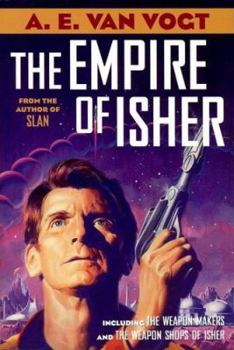The Empire of Isher: The Weapon Makers / The Weapon Shops of Isher
(Part of the The Empire of Isher Series)
Select Format
Select Condition 
Book Overview
Contains Van Vogt's classicThe Weapon Makers and The Weapon Shops of Isher, in two novels that follow a revolution through time travel and the end and new beginning of the universe. By the author of The War Against the Rull. Reprint.
Format:Paperback
Language:English
ISBN:0312875002
ISBN13:9780312875008
Release Date:May 2000
Publisher:Orb Books
Length:288 Pages
Weight:0.90 lbs.
Dimensions:0.9" x 5.5" x 8.3"
Customer Reviews
1 rating
You Should Read This Book Now
Published by Thriftbooks.com User , 16 years ago
I don't know whether Vogt's wonderful short story "The Weapon Shop" preceded these novellas or came after, but I'll bet most of us read that first. It's great to find more on Isher and the Weapon Shops societies, especially now, in a U.S. presidential election year, with all the intense focus on politics and civil liberty. The duo stories deal with some fundamental humans-vs.-government issues which could make you suddenly want to read Thomas Paine. Vogt seems to have been more interested in writing about the sociological future of men than the technological, although the stuff made possible by the "vibration process" in the story is rather stunning. The problem with the technology, though, is that every time you turn around, one side has a bigger weapon than the other, or a better spy mechanism, or something. There's no static catalog of gadgets; the inventory keeps growing. I found it kind of frustrating not to know just what the good guy had in his arsenal. However, those guns that the Shops are so famous for are hardly even in sight. The guns are really more for smaller, hand-to-hand fighting. This book is about the big picture. You won't be reading this for the gadgetry. You'd better care about mankind and his social organization, or leave this alone. The main thrust of these stories is about the ongoing battle against totalitarian government -- and the parts of the story that happen in the small village of Glay show that bad government affects the entire nation/empire, not simply the urban centers. The biggest and most important weapons are psychological, not material. And that is what makes machinist Fara Clark's experience riveting (bad pun not intended), as he finds out what his little village is actually part of. The scenes in which he is whisked to Information Center, a massive building/machine, are fabulous. Here is where Vogt's perfect attention to detail is evident: the sights and sounds of the place, the reactions of everyone as their names are lighted up, and so on. Vogt knows human behavior well. The story is extremely didactic (Go liberty! Go libertarians), but lots of us don't care, I know I can forgive it -- because it's really satisfying to watch Fara Clark discover that the situation he's in is not bigger or more powerful than he is. By the way: When someone hands you a brochure, you should read it. I won't say more on that. For those who are familiar with "The Weapon Shop" in the short story version -- which presents only Fara Clark's experience-- the book presents some nice twists when we find his son (now a major character) isn't what we thought, and the Weapon Shops' inner workings are revealed. The Weapon Makers, which comes second in this book but was written years earlier than The Weapon Shops of Isher, is much less pedantic, as if Vogt needed several years to think about what he wanted to teach us. That lack of pedantry is a relief, but the earlier work is less developed in other ways too -- it lacks some o





